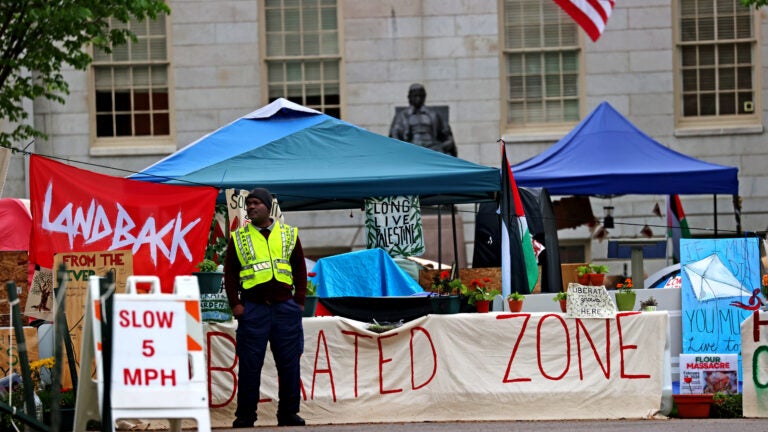Local News
The ruling comes in the aftermath of the student protests that erupted across college campuses last spring over the Israel-Hamas war.
A U.S. federal judge has dismissed a complaint against MIT over its response to antisemitism on campus, but said Harvard may have violated the law.
Both cases took root during a burst of anti-Israel protests on the MIT and Harvard campuses following the Oct. 7, 2023, terrorist attack by Hamas on Israel.
Some students alleged that antisemitic behaviors escalated at both campuses as pro-Palestinian activists held demonstrations, public “die-ins,” classroom walkouts, and rallies. During the spring 2024 semester, students erected encampments at both schools.
During these events, demonstrators chanted charged slogans such as “From the river to the sea,” “Free Palestine,” and “Globalize the intifada.”
The Harvard case:
In the Harvard case, the plaintiffs — Alexander Kestenbaum, a recent Jewish graduate of Harvard Divinity School, and Students Against Antisemitism Inc. — argued that Harvard ignored discrimination against Jewish and Israeli students.
Following the demonstrations in the fall, students say antisemitic episodes on campus intensified in the spring.
In January, vandals defaced posters memorializing Israeli citizens taken hostage by Hamas with messages such as “ISRAEL DID 9/11.” Soon after, court documents say, a Harvard employee emailed Kestenbaum, inviting him to debate Israel’s role in 9/11.
In April, students erected an encampment in Harvard Yard despite being cautioned that it was not permitted. They were allowed to stay until May 14, when interim President Alan Garber said he would negotiate with the students about divesting from Harvard’s endowment ties with Israel.
During one protest rally, court documents say, demonstrators blockaded Jewish students in a study room, and during another, protesters “surrounded and intimidated” Jewish students. Protesting students followed Kestenbaum every time he tried to walk through Harvard Yard, according to the complaint.
US District Court for the District of Massachusetts Judge Richard Stearns dismissed part of a complaint by the coalition of Jewish students, while allowing some of their claims to proceed.
“The facts as pled show that Harvard failed its Jewish students,” Judge Stearns wrote in his order.
Jewish students at Harvard said they faced confrontational and physically violent protests, which caused many to “fear for their personal safety,” “hindered their ability to complete their academic studies,” and made some feel compelled to “doff clothing” that might identify them as Jewish.
The students accused the university of being “deliberately indifferent” to harassment and selectively enforcing free speech policies.
Harvard argued it couldn’t be deemed “deliberately indifferent” given the steps it took to respond to the incidents.
However, the judge wrote, “As pled, Harvard’s reaction was, at best, indecisive, vacillating, and at times internally contradictory.”
To ignore the student’s allegation of deliberate indifference “would reward Harvard for virtuous public declarations that for the most part proved hollow when it came to taking disciplinary measures against offending students and faculty,” the order said.
Harvard also argued that infringing on protected First Amendment activity wasn’t required. Still, the judge wrote the court “is dubious that Harvard can hide behind the First Amendment to justify avoidance of its Title VI obligations.”
Title VI of the Civil Rights Act of 1964 prohibits discrimination by entities that receive federal funding.
Stearns dismissed the claim that Harvard employed a discriminatory double standard in the types of conduct it punished.
The MIT case:
The StandWithUs Center for Legal Justice and students Katerina Boukin and Marilyn Meyers brought the lawsuit against MIT.
The students argued that the university exhibited deliberate indifference to a hostile educational environment impacting Jewish and Israeli students in violation of Title VI of the Civil Rights Act of 1964.
According to court documents, during a rally on Oct. 19, which Meyers attended, a protestor shouted at her and a friend, “Your ancestors … didn’t die to kill more people.”
As time passed, student groups staged demonstrations, including in Lobby 7, a major thoroughfare on the MIT campus.
After a failed attempt to close the encampment on campus in the spring, protestors defaced an Israeli flag on May 8, which resulted in suspensions. When students blocked Vassar Street, police arrested nine students. On May 10, after further police pressure, the encampment was discontinued.
Unlike the Harvard case, Judge Stearns could not find that MIT acted with deliberate indifference.
“Boiled down to its essence, deliberate indifference means affirmatively choosing to do the wrong thing, or doing nothing, despite knowing what the law requires,” he wrote in his order. “Tempered by this understanding, the court cannot find that MIT acted with deliberate indifference.”
The judge noted that MIT could have reacted differently, noting that some campus administrators elsewhere had more positive results than MIT when it came to responding to the protests.
However, Stearns wrote that it is not an “applicable standard.”
MIT’s evolving and progressively punitive response correlates with its awareness of the hostility that demonstrators directed at Jewish students, showing that MIT did not react in an “unreasonable manner,” the judge wrote.
“Far from sitting on its hands, MIT took steps to contain the escalating on-campus protests that, in some instances, posed a genuine threat to the welfare and safety of Jewish and Israeli students, who were at times personally victimized by the hostile demonstrators,” Stearns found.
Newsletter Signup
Stay up to date on all the latest news from Boston.com
